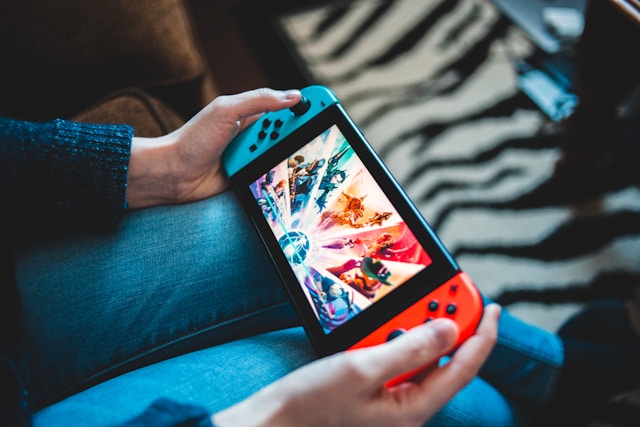- Change theme
Mobile Gaming Trends in the UK: What’s Fueling the Shift in How We Play?

From subway rides to sofa sessions, mobile gaming has become a dominant force in the UK’s entertainment landscape.
23:52 17 July 2025
From subway rides to sofa sessions, mobile gaming has become a dominant force in the UK’s entertainment landscape. But behind the scenes, new technology and evolving player expectations are quietly reshaping the entire experience.
Recent years have seen mobile gaming evolve from casual time-killers like Candy Crush to immersive, feature-rich titles that rival console experiences. In the UK, where around 50% of adults regularly play games, mobile titles account for a significant share of this engagement. With increasingly powerful smartphones, 5G connectivity, and flexible monetization models, the gaming industry is undergoing a mobile-first revolution.
Key Shifts Powering Mobile Gaming Growth
1. Hardware Improvements Are Closing the Gap
Smartphones today come equipped with processors and graphics capabilities that once belonged solely to gaming PCs. Devices like the iPhone 15 Pro and the ASUS ROG Phone 7 can handle intensive 3D environments, ray tracing, and real-time multiplayer, making them ideal for modern games.
These capabilities allow studios to push mobile-first titles that don’t feel watered down. Games like Genshin Impact or Call of Duty: Mobile deliver console-quality experiences directly in players' pockets.
2. Free-to-Play with Flexible Monetization
A major driver of mobile gaming’s appeal is its affordability. Free-to-play games dominate app store charts, but monetization models have diversified. In-app purchases, battle passes, ad-supported levels, and cosmetic microtransactions offer multiple ways for developers to earn revenue without putting up paywalls.
This flexibility encourages broader engagement while keeping casual and competitive players within the same ecosystem.
How UK Players Are Shaping Demand
The UK market stands out for its hybrid engagement style, blending casual puzzle play with competitive esports-like experiences. Localized events, community-driven updates, and loyalty rewards are popular features among British gamers, who often prefer titles that allow short bursts of play rather than long-form sessions.
Games like Clash Royale, Brawl Stars, and even hyper-casual titles like Subway Surfers see strong user retention thanks to regional content drops and seasonal updates.
Regulation and Platform Diversity
In the UK, consumer protections have pushed app developers to offer clear labeling for in-game purchases and stronger data privacy standards. App stores now require transparent odds in loot boxes, and regulators continue monitoring underage access to mature content.
Simultaneously, alternative platforms outside of Google Play and Apple’s App Store are gaining traction. Decentralized marketplaces, direct downloads from developers, and third-party stores are creating new opportunities for game distribution, especially for blockchain or crypto-native titles.
Gambling Apps and the Role of Trust
One of the fastest-growing segments of mobile gaming is real-money gambling and casino apps. While these platforms must operate under strict UK licensing, their global counterparts offer insight into the future of mobile betting.
A growing number of users now expect provably fair mechanics, faster withdrawals, and transparent payout odds — features often more readily available in crypto-powered casinos. For example, Playing at Wild Casino demonstrates how mobile-friendly gambling experiences have evolved. With crypto transactions, low-latency gameplay, and a simplified interface, such platforms mirror many of the design trends found in leading mobile games.
Though not every platform operates within the UK’s jurisdiction, user demand for these features is influencing domestic offerings as well. Operators are being pushed toward faster payout options, better UX, and gamified loyalty programs.
The Blurring Line Between Games and Social Apps
Mobile games are increasingly embedding social features — from integrated voice chat to community forums and Twitch-style streaming. This trend has spawned hybrid platforms where gameplay, community engagement, and micro-content creation intersect.
Some games now include creator tools for building mini-games, designing avatars, or sharing replay clips. As these features become normalized, players begin expecting entertainment platforms to function as social networks, not just isolated apps.
Looking Forward: The Future of Mobile Gaming in the UK
Here’s what industry analysts are watching:
- Cloud Gaming on Mobile: With Xbox Cloud Gaming and NVIDIA GeForce NOW expanding mobile support, the potential for playing full console games on budget smartphones is rising.
- Augmented Reality Integration: UK studios are experimenting with AR beyond Pokémon GO, using location data, object recognition, and local narratives.
- Decentralized Gaming Economies: The growth of tokenized assets and NFTs, especially in gaming, points to a future where players truly own in-game items, potentially trading them across titles or platforms.
Mobile Gaming at a Crossroads
The next few years will likely define how far mobile games can push technologicalboundaries and user expectations. While not every trend will find a home in the UK due to regulatory or cultural fit, the influence of crypto-driven mechanics, social integration, and premium-quality mobile content is undeniable.
The convergence of mobile hardware, app store innovation, and audience sophistication suggests one thing: mobile games are no longer a side project — they’re the centerpiece of gaming’s future.
